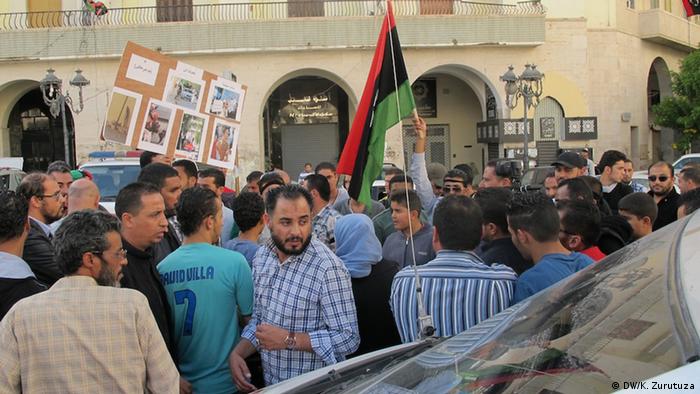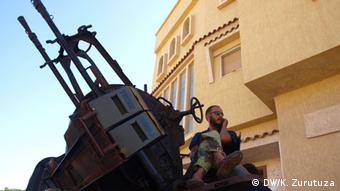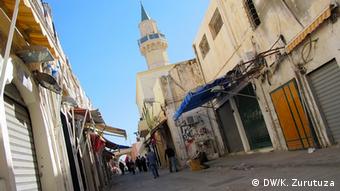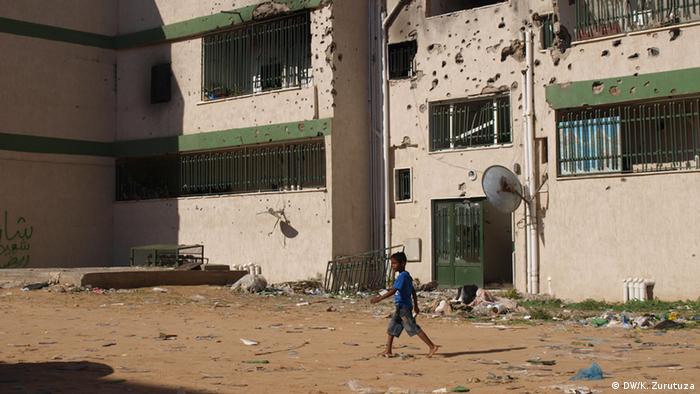Libya's army is deploying on the streets of Tripoli in an effort to
wrestle back control of events that spiralled out of control and into
violence over the weekend. An uneasy calm has settled over the city.
"The Misrata militia are leaving, I still can't believe it," one
protester told DW in Tripoli's Algeria Square, scene of several protests
over the last two years. Sunday's demonstration was called to show the
protesters' anger and to pay respects to those injured and killed in
Friday's incident, when a peaceful march was dissolved by the Misrata
militia, killing dozens and leaving around 500 more wounded.
On Sunday, Misrata's local council announced that their armed militiamen would pull out from the country's capital "within the next 72 hours."
"They must go. We need a real government, a police force and an army able to tackle the ongoing chaos in the country," Fuad Gritli, one of the protests' organizers, told DW.
"With (Moammar) Gadhafi at least we knew who we were dealing with but now it's very much the same people who helped us oust the tyrant," added Gritli, a university student who will not be able to go back to class until Wednesday, due to the general strike coinciding with the three days of mourning for the dead.
Post-Gadhafi chaos
The Misrata fighters are among the most powerful in Tripoli but last Friday's deadly incidents seem to have taken on a new dimension. Abdulhamid Najah, who was also among the protesters, lost one of his neighbors in the violence:
"He was shot three times in the back while he was trying to cover. Another friend of mine was taken to Italy for medical assistance after being seriously injured," Najah, a lawyer, who works for the Libyan Ministry of Justice, told DW. He thinks the "passivity of the government" is to blame for the turmoil.
"Over 40 people were killed in cold blood and they're unable to tackle this," said Najah.
"The worst of it is that I don't know how can we sort Libya out," Rayan, a woman who had turned up to protest against the "illegitimate groups overrunning Tripoli," told DW.
"I often ask to myself whether we need to ask for yet another international intervention, it's all too depressing," she said.
What next?
"The incidents on Saturday are just a reminder of the serious security problems we have in the country," Elnass told DW. She admitted that the government she represents is "not able to control the militias operating at their will in our streets."
The militias blocking the road, often in plain clothes, at times identify themselves simply as "Amazighs" - also known as Berbers, the biggest minority group in Libya - others refer to themselves as "Misratis," or as "Libya's only true Muslims."
Many people can get in trouble even before producing their passport.
"They just stop me because I'm black and they ask me whether I'm from Tawargha," a taxi driver who wished to remain anonymous told DW. Tawargha was the town which also served as the headquarters for Gadhafi's troops during the siege of Misrata.
Game of Thrones
Two years later, Tawargha has turned into a ghost town after its population, the majority of them black, was either killed or displaced and sent to makeshift camps like those on the outskirts of the capital.
In fact, kidnapping also seems to be a common currency even among the highest levels of Libyan society. Intelligence deputy Mustafa Noah was grabbed in a car park on Sunday after returning from Istanbul, where he had attended a meeting with the Muslim Brotherhood, before being released again on Monday - an episode reminiscent of Libyan Prime Minister Ali Zeidan's ordeal who was also recently taken hostage and freed hours later.
"We've shifted from euphoria after ousting Gadhafi to a state of general depression," women's rights' activist Asma Bin told DW. The 30-year old from Tripoli said there were numerous assaults on women and even kidnappings.
"Investigations will only be conducted if any of the victims are related to any of the militias in the area. Then they'll search every house in the district and they may even end up arresting and torturing an innocent man just because he looks 'suspicious' to them," she said.
"Libya is like a Game of Thrones. It's a ruthless and lawless land where different factions clash with each other. And it's all about greed and power."
On Sunday, Misrata's local council announced that their armed militiamen would pull out from the country's capital "within the next 72 hours."
"They must go. We need a real government, a police force and an army able to tackle the ongoing chaos in the country," Fuad Gritli, one of the protests' organizers, told DW.
"With (Moammar) Gadhafi at least we knew who we were dealing with but now it's very much the same people who helped us oust the tyrant," added Gritli, a university student who will not be able to go back to class until Wednesday, due to the general strike coinciding with the three days of mourning for the dead.
Post-Gadhafi chaos
Heavily armed militia control large parts of Tripoli
Libya's post-Gadhafi government has struggled in vain to
prevent armed groups from Misrata and other towns from controlling the
capital's districts. All of them were originally set up to oust Gadhafi,
but they refused to disarm when the war was over.The Misrata fighters are among the most powerful in Tripoli but last Friday's deadly incidents seem to have taken on a new dimension. Abdulhamid Najah, who was also among the protesters, lost one of his neighbors in the violence:
"He was shot three times in the back while he was trying to cover. Another friend of mine was taken to Italy for medical assistance after being seriously injured," Najah, a lawyer, who works for the Libyan Ministry of Justice, told DW. He thinks the "passivity of the government" is to blame for the turmoil.
"Over 40 people were killed in cold blood and they're unable to tackle this," said Najah.
"The worst of it is that I don't know how can we sort Libya out," Rayan, a woman who had turned up to protest against the "illegitimate groups overrunning Tripoli," told DW.
"I often ask to myself whether we need to ask for yet another international intervention, it's all too depressing," she said.
What next?
Much of downtown Tripoli is deserted
In fact, "what comes next?" is a recurrent question among those
gathering outside the closed-down shops and stalls. The questions pops
up everywhere you go in downtown Tripoli, and also in government offices
like that of Wafa Elnaas, the head of the Office for the Libyan
Internal Displaced People."The incidents on Saturday are just a reminder of the serious security problems we have in the country," Elnass told DW. She admitted that the government she represents is "not able to control the militias operating at their will in our streets."
The militias blocking the road, often in plain clothes, at times identify themselves simply as "Amazighs" - also known as Berbers, the biggest minority group in Libya - others refer to themselves as "Misratis," or as "Libya's only true Muslims."
Many people can get in trouble even before producing their passport.
"They just stop me because I'm black and they ask me whether I'm from Tawargha," a taxi driver who wished to remain anonymous told DW. Tawargha was the town which also served as the headquarters for Gadhafi's troops during the siege of Misrata.
Game of Thrones
Two years later, Tawargha has turned into a ghost town after its population, the majority of them black, was either killed or displaced and sent to makeshift camps like those on the outskirts of the capital.
Two years after the war many districts of Tripoli are still in a state of dereliction
"The Misrata militia wait for us outside and they either kidnap our
people or shoot us on the spot," refugees at the Tarik Matar airport
road camp told DW. Last Saturday, an armed gang broke into the nearby
Fallah camp and killed 28-year-old Abu Muntalib and wounded two others.In fact, kidnapping also seems to be a common currency even among the highest levels of Libyan society. Intelligence deputy Mustafa Noah was grabbed in a car park on Sunday after returning from Istanbul, where he had attended a meeting with the Muslim Brotherhood, before being released again on Monday - an episode reminiscent of Libyan Prime Minister Ali Zeidan's ordeal who was also recently taken hostage and freed hours later.
"We've shifted from euphoria after ousting Gadhafi to a state of general depression," women's rights' activist Asma Bin told DW. The 30-year old from Tripoli said there were numerous assaults on women and even kidnappings.
"Investigations will only be conducted if any of the victims are related to any of the militias in the area. Then they'll search every house in the district and they may even end up arresting and torturing an innocent man just because he looks 'suspicious' to them," she said.
"Libya is like a Game of Thrones. It's a ruthless and lawless land where different factions clash with each other. And it's all about greed and power."



